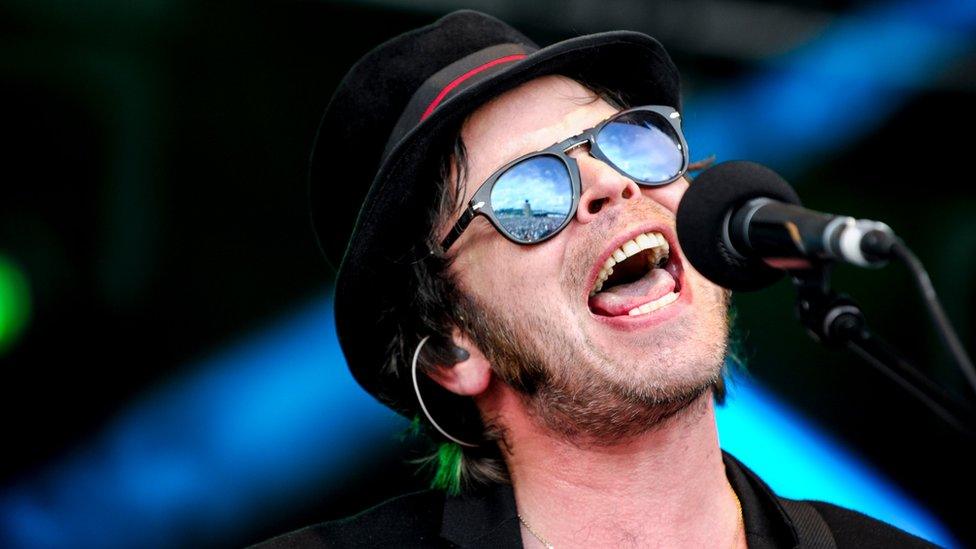Radiohead, Foals and 25 years of discovering Oxford music
- Published
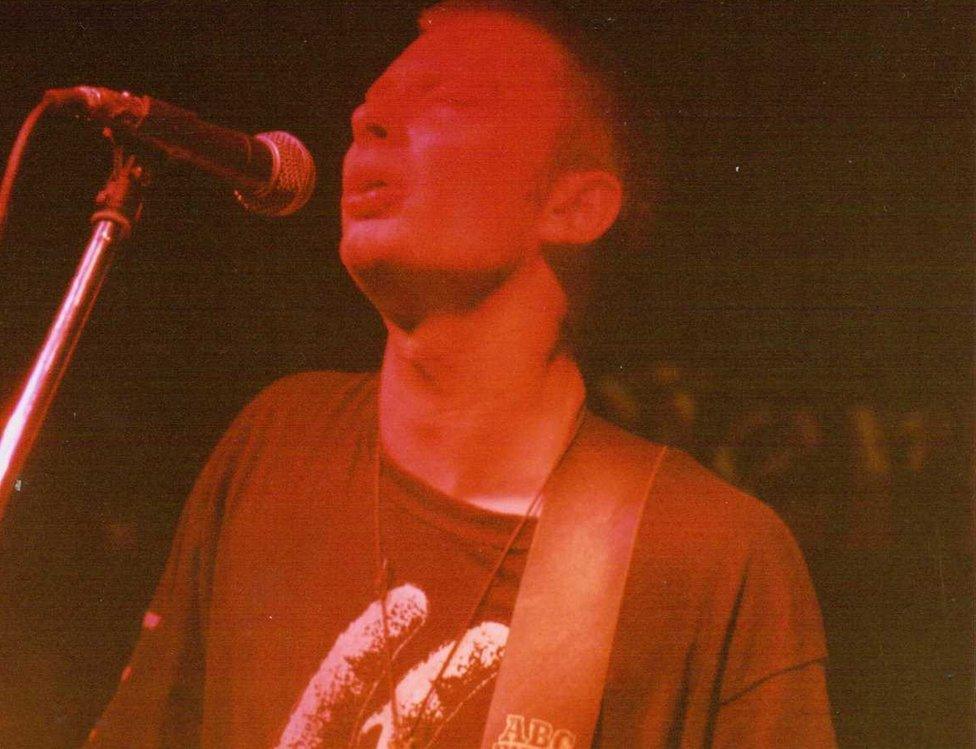
On a Friday's gig at the Jericho Tavern grabbed the attention of Curfew magazine
One man has been at the centre of Oxford music for quarter of a century, championing the likes of Radiohead, Supergrass and Foals in the pages of his self-produced magazine.
Ronan Munro's first impression of Thom Yorke was that he was a man on a mission.
The Radiohead frontman, who at the time played in Oxford band On A Friday, was giving local music magazine Curfew his first ever interview.
The band were all present, at a house they shared in Ridgefield Road.
"They were all really nervous because they'd never been interviewed before, and they were really nice guys," Munro remembers.
"But Thom wasn't like anyone I'd interviewed before. He was so focused. He was like 'This is going to happen… failure is not an option'.
"I really took that away from it. He wasn't some ranting diva or a megalomaniac, but he was so focused on what he wanted to do."
"I remember that first interview very clearly," Radiohead bassist Colin Greenwood says today.
"We had a shared house, like The Monkees. Or we were more like the Banana Splits.
"It was a great experience to do it with a really committed local person.
"Ronan was the centre of the Oxford music scene for years.
"A lot of what happened wouldn't have happened if he hadn't have been there."
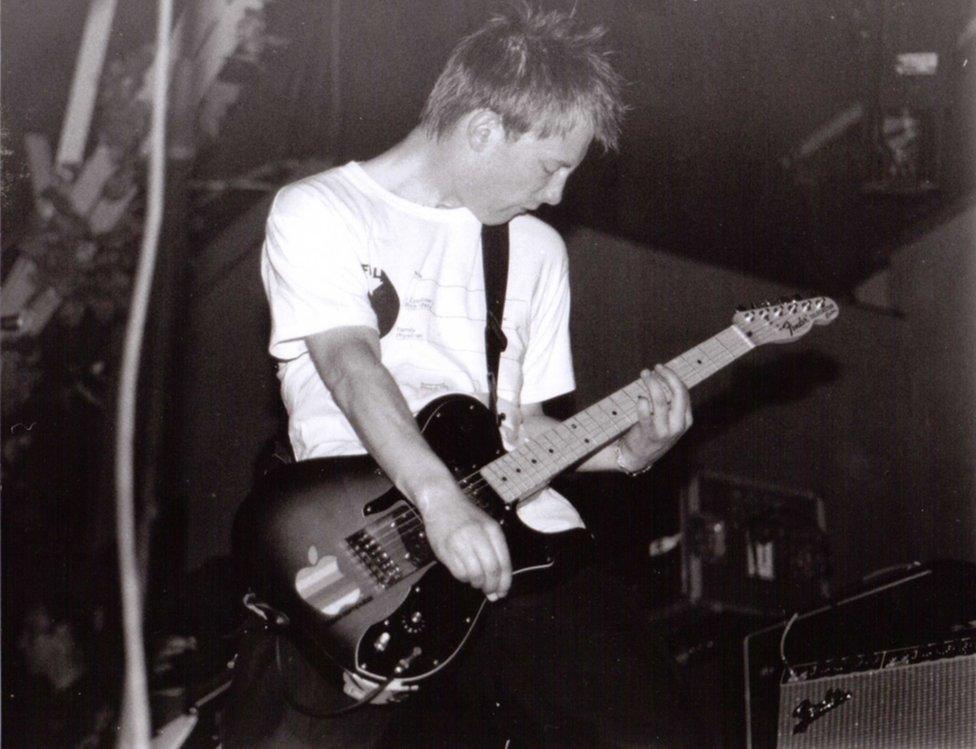
By the time of Radiohead's 1996 Zodiac gig, the band were a worldwide success
Munro started Curfew after coming back from a tour with Oxford band Ride, where he sold merchandise at their shows.
"He knows his music, he's passionate about it, and it's just selling him short, selling T-shirts," Ride's Mark Gardener believes.
"But for him it was fun to be on the road and be a part of it."
Inspired by the band's success, Munro thought a music magazine could be just the thing to find the next Ride.
"I thought Ride had become successful, but there were other good bands," Munro remembers.
"Bands had to play in London to get a review, like climbing a ladder where the rungs didn't start until halfway up.
"They needed something lower down and that's why they needed Curfew."
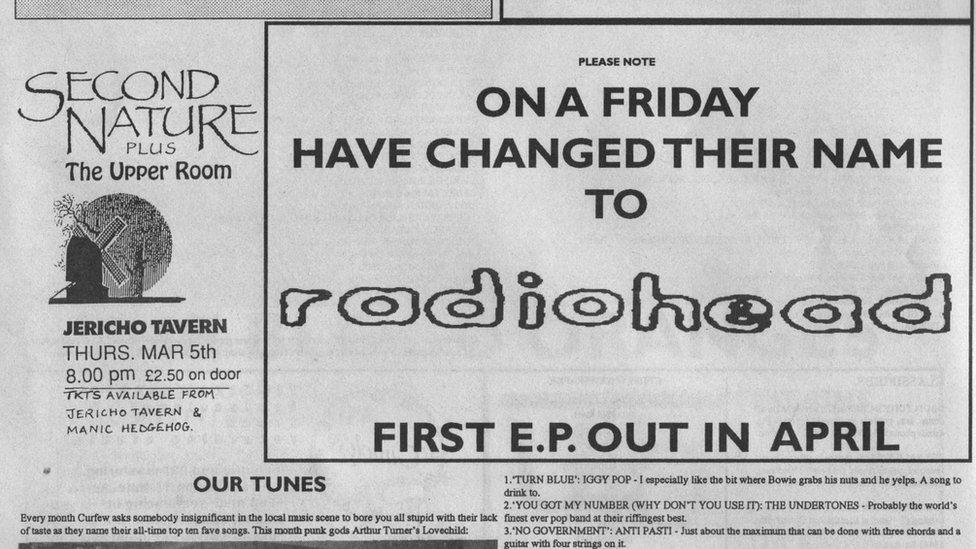
Curfew was the best place to let On A Friday fans know that the band had changed its name
True to that ethos, he gave On A Friday their first gig review.
"What really grabbed me was Thom Yorke's voice, because it wasn't like anything else," he says.
"Music-wise they had a bit of the current indie sound, a bit noisier, a bit sharper."
When the band decided to change their name to Radiohead, in that pre-internet, pre-Twitter age, they took out a £30 space in the magazine.
"That's an announcement and a half," Greenwood laughs. "We should have hired one of those skywriting planes instead.
"It meant the 50 people bothered to follow us could be aware of the fact that we'd changed our name, which is quite funny."
Curfew was distributed free at venues and stores across the county.
Munro even hand delivered copies to Our Price, where he once worked alongside assistant manager Steve Queralt, who was also the bass player in Ride.
Their newest sales assistant was Greenwood.
"I was waiting for everyone in the band to finish college, and I thought I'd stay in Oxford and find a job working in music," he explains.
"I'd chat with Ronan about who was playing where and through him we met [promoter] Mac at The Venue. It was fantastic."
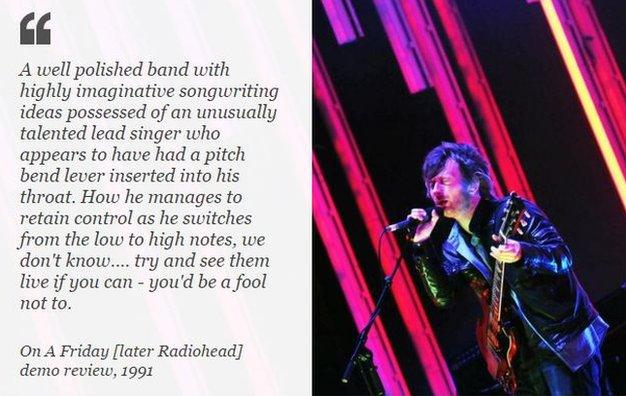
When Radiohead put on a gig at The Venue to film the video to their new single Creep, external, they donated the proceeds to the magazine.
"It was sold out, it was mad. They did a truncated gig and played Creep a few times," Munro says.
"It was going to be free but they asked everyone for contributions, and Colin and Ed [O'Brien, guitarist] brought the money to my house in a plastic pint glass.
"It was probably a couple of hundred quid and paid for a computer."
Over the next few years the band kept improving.
"I gave [debut album] Pablo Honey a good review but it wasn't well received, and I knew they were close to being dropped.
"And it was Creep that saved them. That's the short-sightedness of the music industry."
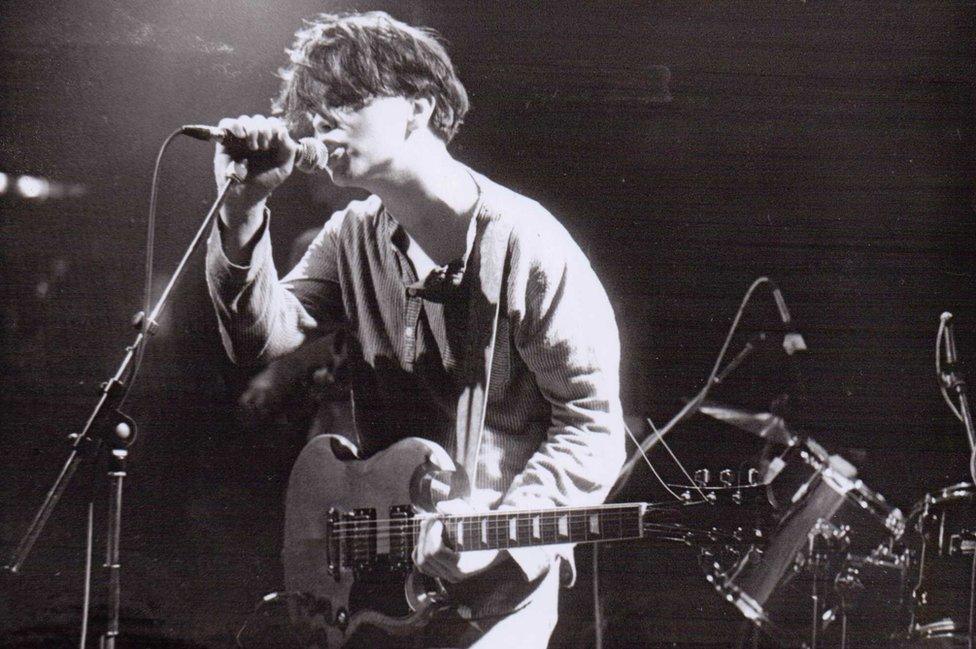
Supergrass started out as The Jennifers with a 15-year-old Gaz Coombes at the microphone
Curfew's third issue in May 1991 featured The Jennifers on the cover, who would later become Supergrass.
"They were funny little 15-year-old scamps who used to hang around the car park at the Jericho Tavern, too young to get in," Munro recalls.
"They would pull so many people to their shows. They were very young but well beyond their age musically."
Drummer Danny Goffey remembers being a Curfew cover star.
"There was a picture of us in a line and we were interviewed. I was probably about 17, Gaz [Coombes, singer] a couple of years younger.
"We knew Oxford inside out by that time, all the pubs. We were early starters. We cut our teeth in them.
"I remember Barcelona's down Little Clarendon Street. Me and Gaz went in there in our pyjamas and got thrown out."
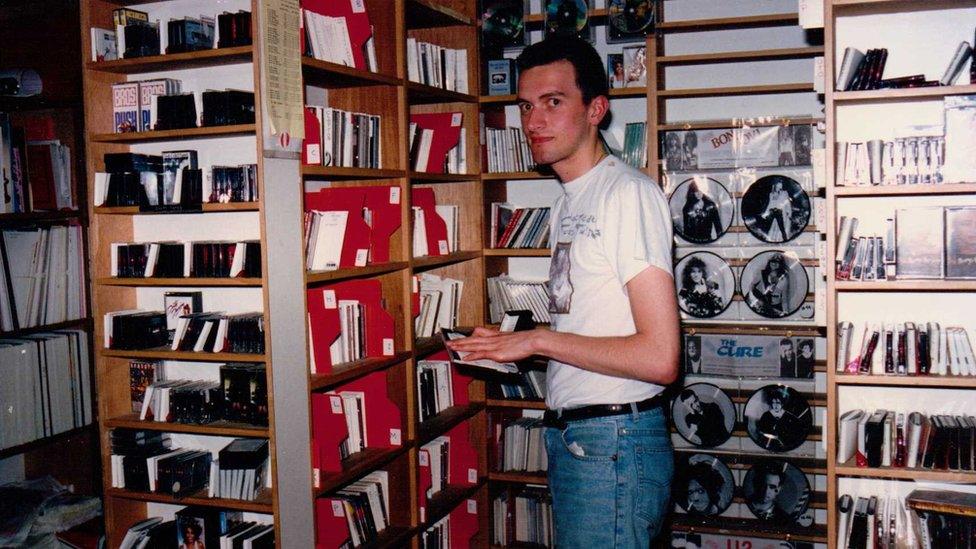
Ronan Munro met many musicians during his time at Our Price Records
Supergrass formed in 1993 when Gaz and Danny added bassist Mick Quinn to their line up.
According to Munro, their gig at the Hollybush Inn, Osney Island, "was another 'Blimey, what was that?' kind of thing".
"Suddenly this band had grown wings," he adds. "They were a huge blast of pop energy."
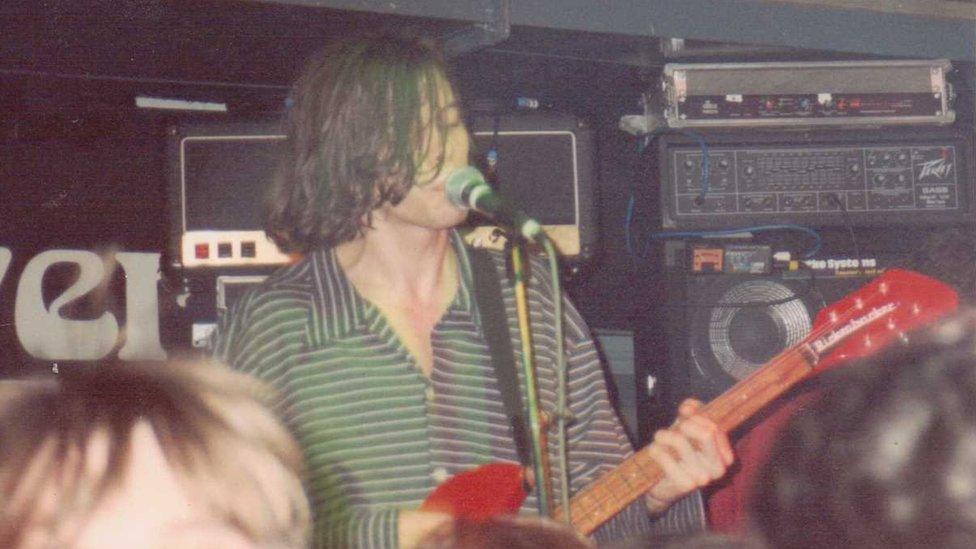
Ride's Oxford gigs in the late 1980s "blew the place apart"
Munro's immersion in the scene began with the job at Our Price where "half of the people were in bands".
It meant he saw Ride's first public gig at the Jericho Tavern.
"People came in as they were sound-checking and were applauding. They were stunning. They blew the place apart.
"Everything suddenly went mad, word got out, and they got rave reviews in the NME and Melody Maker."
Ironically, by 1994 several venues closed down, and, with no advertising to keep it afloat, Curfew folded in December.
By the following July things had picked up enough for Munro to launch new title Nightshift.
It championed the likes of The Unbelievable Truth, The Candyskins, The Young Knives, Stornoway, Glass Animals, Chad Valley and Elizabeth.
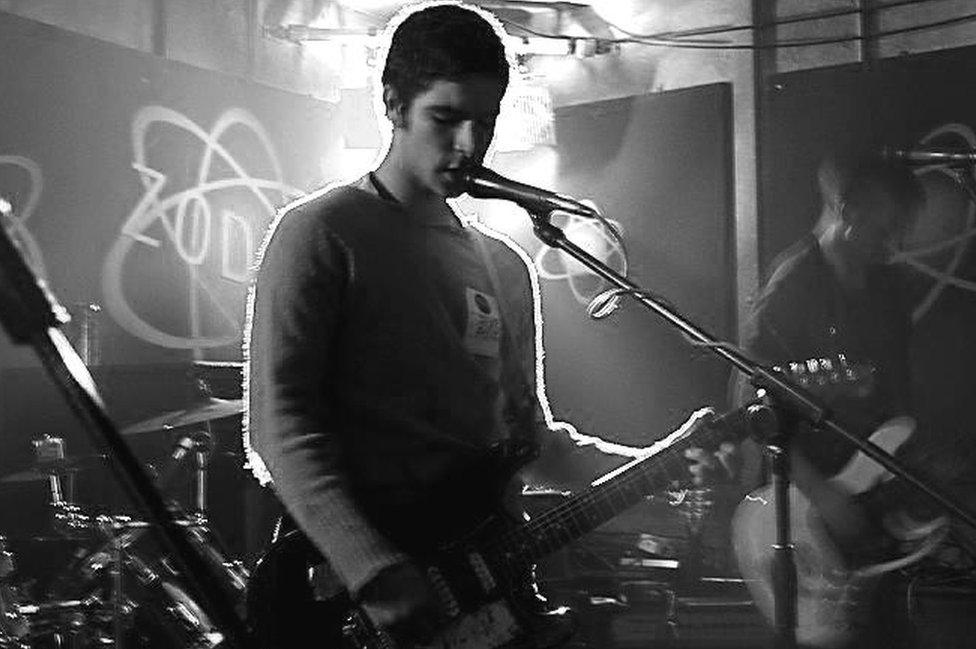
Elizabeth, an early guise of Foals, were reviewed in 2003
Ronan saw Elizabeth's first ever gig at the Zodiac.
"They were this bunch of 15-year-olds who I gave a rave review.
"I went to every gig after that. Then they came out the other side as a band called Foals.
"When they opened up at The Wheatsheaf I thought it was a great indie noise, but disco and funk as well. Their early gigs were intense."
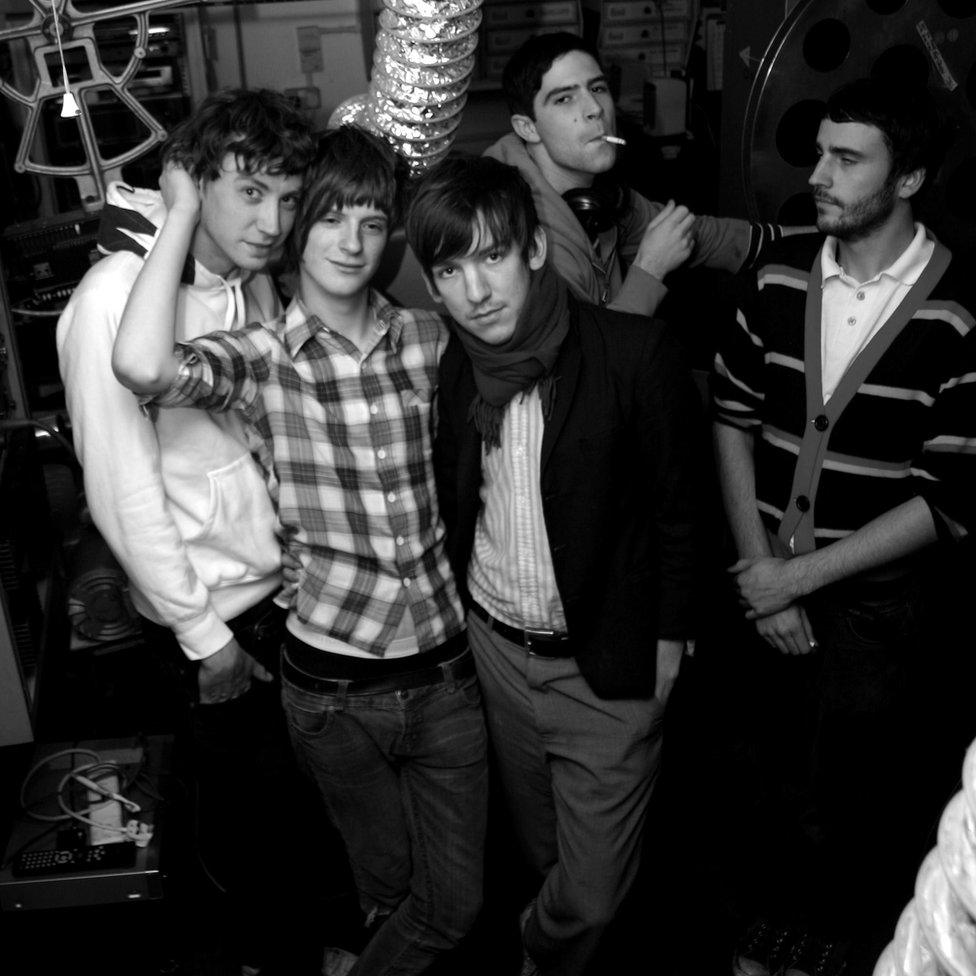
Foals made Nightshift's cover on November 2006 in an issue containing their first interview
Munro handpicked Elizabeth to play his annual showcase The Punt.
"Yannis Philippakis was smashing his guitar open on the stage having an outburst… but you've got to take that side of an artist.
"If they channel it into the intensity of the performance like he did then it's brilliant."
And Philippakis was, according to Munro, "always nice and very determined".
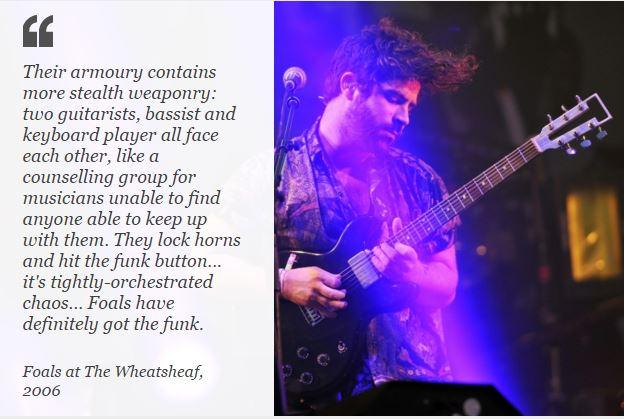
As far as Greenwood is concerned, Munro's reviews were "always fair, and never false or gushing".
"He's honest and he recognised the people who worked hard... it's a difficult job and it's full of his personality."
But Munro, who works on the magazine alongside his role as a househusband, modestly asserts: "I haven't made a band ever, you just give people that little step up."
- Published25 December 2015

- Published16 October 2015
